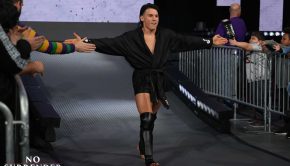Gladiator Sports Network’s Al Snow On His Decades Within Professional Wrestling & More
Both inside and outside of the ring, Al Snow is a stand-out success within the world of professional wrestling. Active as a wrestler since the early 1980s, he was a Tag Team Champion, Hardcore Champion and European Champion within the WWF. Behind the scenes, he has been one of the business’ most sought-after trainers, backstage producers and creative minds for decades.
While Snow still does independent appearances and runs seminars around the world, most of his efforts are rooted in Louisville, Kentucky. Last year Snow acquired Ohio Valley Wrestling, the former WWE developmental territory which counts John Cena, Brock Lesnar, Batista, Big Show, Cody Rhodes and Randy Orton among its alumni. OVW is part of the larger Gladiator Sports Network, which also includes Top Knotch Boxing. Meanwhile, Snow also has a clothing line (COLLARxELBOW) and a forthcoming memoir (Self Help: Life Lessons From The Bizarre Wrestling Career Of Al Snow).
During WrestleMania Weekend, I had the pleasure of interviewing Al Snow himself at New York City establishment Connolly’s Pub & Restaurant. Below are highlights from my chat with Snow. More on Snow’s various projects can be found online at www.gladiatorsportsnetwork.live, www.collarandelbowbrand.com, and www.ovwwrestlingnetwork.com.
On his new book:
Al Snow: I wrote a book about my career and my experiences in wrestling. It comes out on May 25th. It’s called Self-Help. The actual title that I wanted was How To Take S**t And Make Shoe Polish And Other Lessons I learned In Wrestling, but the publisher was like, “Oh, we’ll just call it Self-Help.” (laughs) I think my title was better, but you know, whatever.
On how long he spent writing the book:
Al Snow: Gosh, it was at least a couple of years. I mean, I was amazed at the amount of time and really the effort that goes into publishing a book. I was really taken aback by how much time and effort it really takes to do it.”
On when he realized that he could be a good teacher:
Al Snow: I don’t know it I realized as much as I just started doing it. I feel that I can be honest, almost to a sense brutally honest. I feel that I’m doing a disservice to people if I’m doing anything but. Being in the wrestling business, this may come as a shock but I’m a really accomplished liar. (laughs) I really quite honestly am.
My belief is that perception is reality. I can’t change the color of grass. But if I make you believe the grass is blue instead of green I’ve changed your perceptions in terms of altering your reality. And that was what I was taught to do as a professional wrestler. Quite honestly I’m really good [at that].
But here’s the other problem. I was brought into the wrestling business when it was almost like the mob. Very closed, very secular, there were rules, there was an etiquette, rules that were adhered to and there were consequences for not doing so. One of those was that anybody you trained you were held personally responsible for. If they affected business, they affected yours more than anyone else’s because you were blackballed from the business itself. So I still hold that very truth, that every single person that I train is a direct reflection on me.
I still feel telling you something that’s not true does not really benefit me or you at all. And it may seem like a magnanimous thing, but it’s not. I tell everyone that I want you to succeed absolutely as much as possible, not because I’m a charitable guy, but because I’ve had a 37-year legacy and you’re now a part of that. You’re now part of that reputation… The more you succeed, the more I succeed. The better you look, the better I look… It really has everything to do about me and how great I want to look. (laughs) So it’s still very selfish at the end of the day.
On his love for the wrestling business yet understanding commerce involved:
Al Snow: I want nothing more than for it to survive or succeed and to grow and to build as much as possible. I know and understand that. No offense but the wrestling business belongs to the wrestlers. Once they walk through the curtain, no matter how much everybody applauds, Vince [McMahon] is a genius, which I’m not going to deny… That performer walks through the curtain… It is 100 percent on them. And if they don’t give something sufficiently to allow him to promote and to exploit, well, they’re not going to survive. The more I can instill that in the athletes, the performers, the more the art of professional wrestling moves along.
On when he realized he would be part of the wrestling business for life:
Al Snow: I never thought of anything else. I never imagined or envisioned me doing anything else. Maybe that’s myopic, maybe that’s not healthy. (laughs) Trying to envision things in a broader sense, the wrestling training came about simply because I wanted to start to run and promote my own shows. I didn’t want to beholden to a promoter and wait for the call. I wanted to take control of my own destiny, and as a result I knew that the shows would operate as an outlet and also advertise for the school, or the school would be operate as a function of building and creating talent for the shows. It would literally become a cycle unto itself. As a result that was how I had gotten involved in that.
On being trained properly:
Al Snow: I simply, to the credit of the person who broke me in [to the business], he was very very conscientious of training me on all the little things that no one gets trained on. He was very meticulous on teaching me timing and footwear and distance, learning how to walk properly… If you watch a professional fighter, whether it’s MMA or boxing, the thing you never see them do is cross their feet… It’s not just a cosmetic thing. It is now a matter of safety.
I’ve seen so many times on the independents, the rings are a little wonky, a little kabuki-ish, the canvas is torn. I’ve seen guys cross their feet, twist their ankles, blow out their knees. One night two guys were about to wrestle. So the guy crosses his feet, his ankles are like a cross, his opponent comes at the last second, he goes to turn off his feet, he trips up, he hits his head… It’s a matter of professionalism. Professionalism comes down to two things. One, that it’s an actual profession, so you apply yourself much like it is which is a job. It’s not a hobby, it’s not an endeavor, it’s not a pastime, it’s a vocation. Two, is that you can do what you do so well that it looks easy and effortless to everyone who’s in the audience. Hence the idea from the beginning that all of wrestling is “fake,” but nothing could be further from the truth.
On people referring to wrestling as being “fake”:
Al Snow: The only thing that is “fake” or not real is the outcome. We know who’s going to win and lose. Other than that, physically everything we do in the ring is quite real. It is founded on actual physics and true fighting forms. Every fighting style has its own distances, timing, footwork. Professional wrestling is no different. If you’re not taught those things at the very beginning… If you’re building a house and you don’t have a foundation, your house is wobbly.
On the evolution of professional wrestling:
Al Snow: The only thing that has changed in professional wrestling is the audience. Professional wrestling has been and always will be an indirect reflection of modern society. Look back through the years, where your heels during World War II, they were always Japanese or German. You think that was by accident? In the 60s and 70s, hippies and motorcycle gangs. It is the easiest path to the strongest emotional response to get the easiest responses out of a large mass audience, which are fear and anger, the most easy to manipulate. If you don’t believe me, watch the local news. “Hey there’s something in your house that could kill you. Tune in at 6:00, you’ll find out.” “I’m sorry it’s 2:00 in the afternoon, I’d kind of like to know now.” (laughs) “I’m not going to wait to find out what’s in my house.”






























